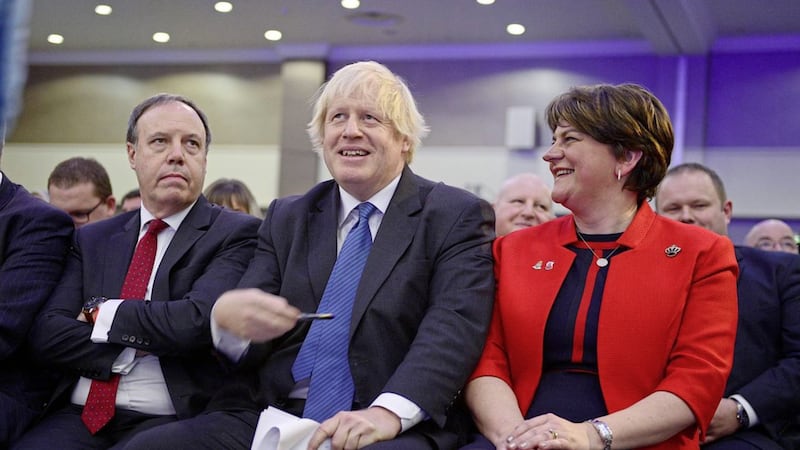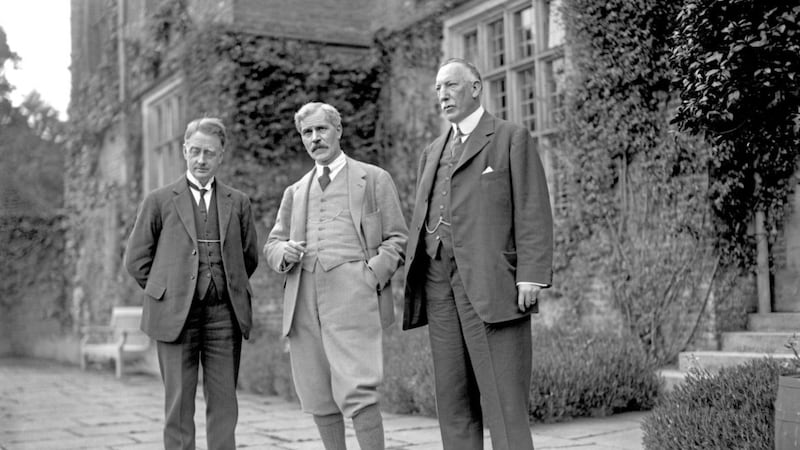Everyone knew Boris Johnson would throw the DUP under a bus but there is surprise at how quickly the party reversed it back over the prime minister. By forcing a Brexit extension, in votes where its MPs were decisive, the DUP caused Johnson to miss his “do or die” deadline and “pause” his Brexit legislation.
However, the DUP still refused to back Labour moves for a soft Brexit, which would have forced Johnson to avoid a sea border through customs union membership.
Instead, it is still trying to keep the government in limbo while haggling and blustering for tweaks to the deal. Perhaps this will extract some concessions and the EU will even go along with them. Or perhaps the prime minister will get an election and ram his deal through without unionist support. Either way, the DUP has lain back down in front of the bus.
**
Deciding whether to press for an election before a deal has caused a toxic split among Downing Street advisers, with an uncanny Northern Ireland dimension. According to a report in Buzzfeed, those favouring an election first are led by former staff of the Vote Leave campaign, which was closely linked to the DUP.
Those favouring a deal first, who call themselves “the sensibles”, are led by Professor John Bew, son of Queen’s University Belfast historian Lord Bew, a former adviser to David Trimble.
This marks the final Ulsterisation of British politics.
**
A meeting of loyalists over the Brexit deal has been followed by warnings of “civil disobedience” but it is hard to see what effective form this might take. A sea border, however economically intrusive, will not manifest itself in ways amenable to direct action. Ports and airports could be disrupted by blockades but forcing frictionless trade through is the opposite challenge. What would such action look like? Marching into company offices to stop staff filling in shipping declarations? Storming the docks at Belfast to wave lorries past inspectors? What if the inspections are at Heysham?
Little wonder all loyalist sources have specified so far is boycotting peace process junkets with the Irish government.
**
Stormont was recalled for one day after a thousand-day absence in scenes eerily reminiscent of its last day of business. Then as now, DUP leader Arlene Foster declined to show humility or reflection for her starring role in a disaster, engaging instead in petulance and procedural grandstanding while other parties walked out in despair.
“It’s not over,” Foster said as she left the chamber. For her it surely is. Anyone who can get through the past three years still clearly believing themselves to be “accountable but not responsible” cannot lead a party, let alone a power-sharing executive. There is no point bringing Stormont back until she is gone.
**
The enactment of Westminster’s abortion legislation, which provoked the assembly recall, has caused the Public Prosecution Service (PPS) to drop charges relating to the online purchase of abortion pills. Mystery remains over why these cases were pursued so aggressively in the first place. The criminal justice system is not an automatic machine: it acts on policy choices. How was this choice justified in terms of police resources and prosecutions in the public interest? Northern Ireland has hardly been short of other crime-fighting priorities.
**
With Stormont dying in a ditch, to use the phrase of the moment, extra attention focused on Westminster’s Northern Ireland Affairs Committee as MPs grilled the secretary of state. The committee can only grow in prominence as we slide towards direct rule, functioning as a kind of opposition. Sinn Féin has previously testified to the committee although it does not take its seats.
Northern Ireland was also discussed at Westminster’s defence committee, where ministers, MPs and defence chiefs proposed addressing the legacy of the Troubles through a South Africa-style truth and reconciliation commission. Their enthusiasm for this venerable idea seemed due to believing the South Africans conferred amnesty for testimony, promising a conveniently neat catharsis. In fact, amnesty had to be requested, the decision process was public and painful and three-quarters of requests were turned down.
**
Is the sea border unlawful? Writing in the Irish Times, constitutional and EU law professor Ronan McCrea has made a strong case for it. Because the latest Brexit deal converts the backstop into a frontstop, the Article 50 withdrawal process has been used to determine the UK’s future trading relationship, at least for Northern Ireland. This appears to breach the Treaty on European Union so the European Court of Justice would have to strike it down, although as Prof McCrea notes, the court “has in the past been willing to be flexible with the limits imposed by the Treaty.”
Would the DUP endure the absurdity of taking its case against Europe to Europe? Stranger things have happened.









